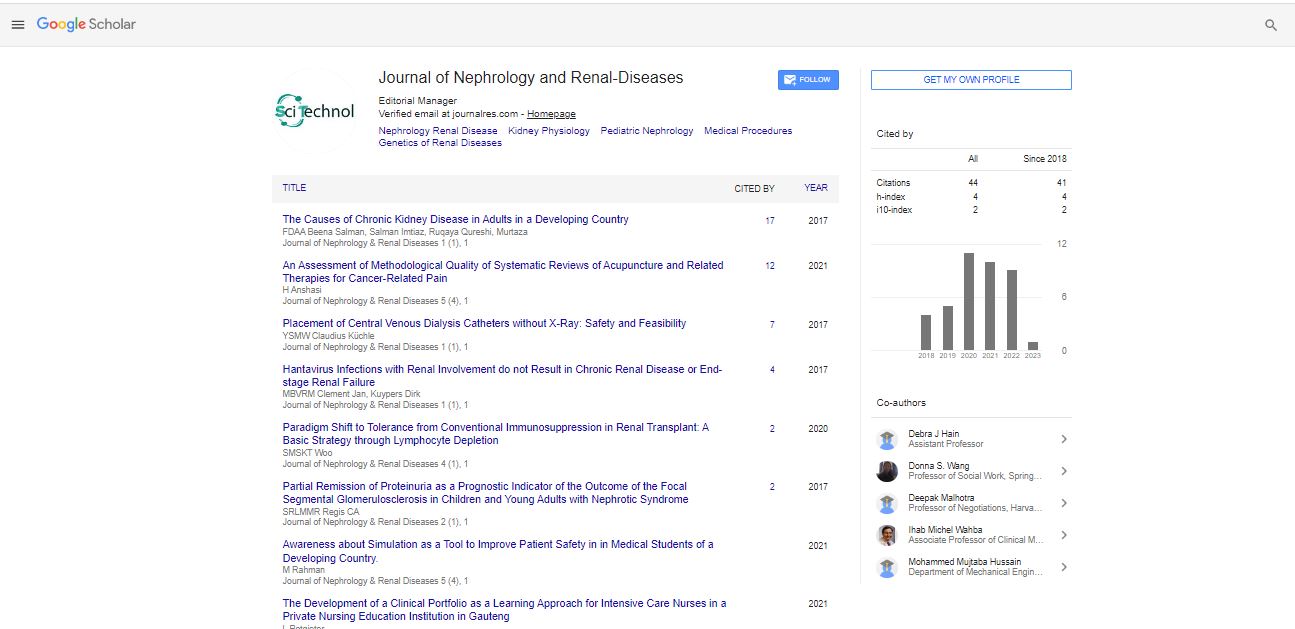CD44 in glomerular parietal epithelial cells as a putative pathological marker of renal dysfunction in primary focal segmental glomerulosclerosis
Froes Bp, Araujo Sa, Bambirra Ea, Oliveira Ea, Simoes E Silva Ac, Pinheiro Sv
Department of Pediatrics, Pediatric Nephrology Unit, Faculty of Medicine, Federal University of Minas Gerais, Belo Horizonte, Brazil
Division of Renal Pathology, Clinics Hospital, Federal University of Minas Gerais, Belo Horizonte, Minas Gera
: J Nephrol Ren Dis
Abstract
The search for risk factors for chronic kidney disease in children with Focal segmental Glomerulosclerosis(FSGS) is important to define prognosis and individualized treatment. This study investigated whether CD44- immunostaining in glomerular parietal-epithelial-cells(PEC) is a pathological marker of FSGS. In this retrospective study, 26 patients with FSGS and 37 patients with minimal-change disease(MCD), biopsied from 1985-2010, were evaluated. Immunohistochemistry for CD44 was performed in all cases. Patients were grouped according to the positivity or not for CD44 in PEC. As expected, no CD44-positive PEC was observed in MCD biopsies, suggesting that CD44-positive PEC could be a useful indicator of FSGS. Eight patients with FSGS presented CD44-positive PEC. Thus, we investigate whether CD44-immunostaining in PEC were associated with renal deterioration. Primary outcome was decline of estimated glomerular filtration rate(eGFR) of 50% or more. Median follow-up was 6.9years. Median renal survival was 14.5years and probability of a 50% decline of eGRF was 30% in 10years. Nine children exhibited primary outcome and 7 developed ESRD. In comparison to PEC-CD44- negative-patients(n=18), PEC-CD44-positive-patients(n=8) presented lower baseline eGFR(99±41 versus 141±44ml/ min/1.73m2, p=0.035) and a significant decline of eGFR(- 38.6±39.5 versus -5.6±25.3ml/min/1.73m2/year, p=0.018). No difference was observed in FSGS subtypes. Presence of CD44-staining in PEC was significantly associated with the decline of baseline eGFR of 50% or more. Renal survival was significantly reduced in PEC CD44-positive patients(3.8 versus 14.6 years in CD44-negative, p<0.05). Our findings indicated, for the first time, that the positivity for CD44 in PEC seems to be a pathological marker of renal function deterioration in patients with FSGS.
 Spanish
Spanish  Chinese
Chinese  Russian
Russian  German
German  French
French  Japanese
Japanese  Portuguese
Portuguese  Hindi
Hindi 
